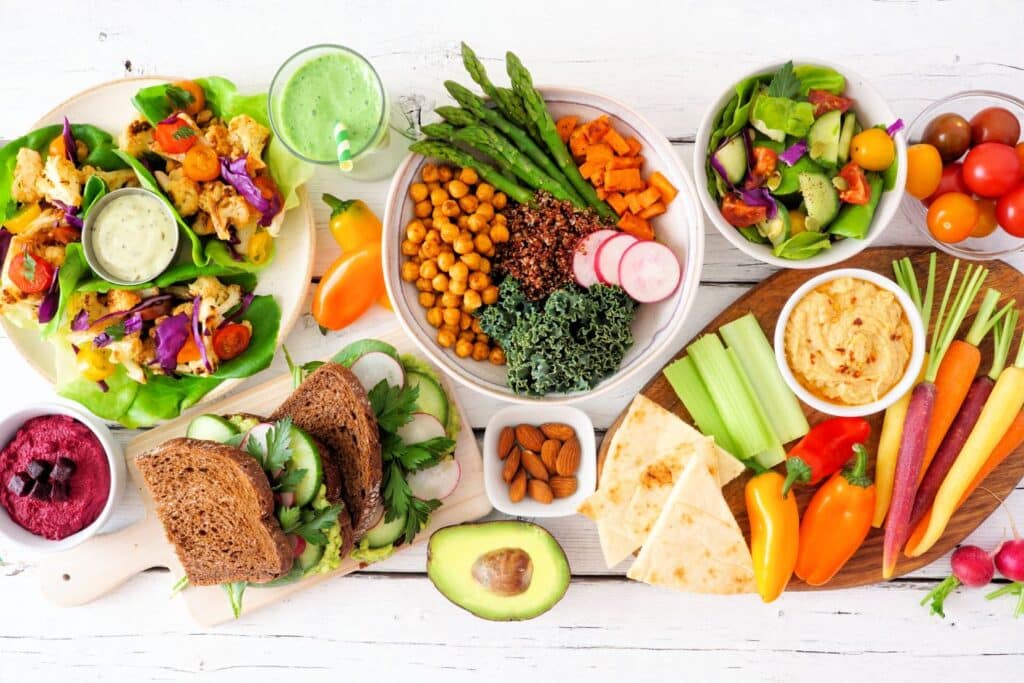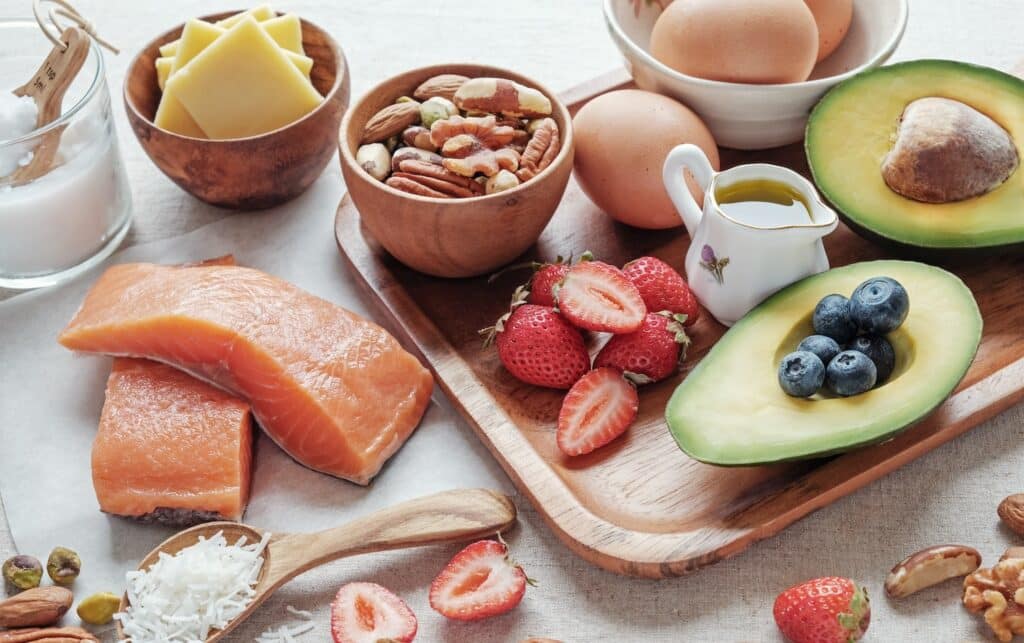You probably already know that being active may help your brain grow and change. But it’s not just exercise that boosts brain development. Enter: foods that can help you focus.
There are many foods that can also aid mental performance. So if you have trouble concentrating throughout the day, your diet may be to blame.
Does your diet really affect your focus and productivity?
Your diet and your brain are closely linked. Adding healthy foods to meals and snacks can improve concentration and keep you alert. Of course, you can’t just eat anything – the specific foods you choose are important.
Registered dietitian and MyFitnessPal scientific advisor Erin Palinski-Wade recommends choosing meals that contain high-fiber, slow-digesting carbohydrates and lean protein. Examples include chicken breast with broccoli or black beans with brown rice.

12 Foods That Boost Concentration
Lean protein, healthy fats, leafy greens, vegetables, fruits and nuts are all good brain foods.
We asked Palinski-Wade to recommend 12 foods that have been shown to help maintain mental energy and improve focus:
1. Eggs
After a night’s rest, your body needs energy, and a recent study shows that high-quality protein in the morning can provide energy and focus. Eggs are the perfect addition to a high-protein breakfast, containing all nine essential amino acids your brain and body need.
“Eggs also contain choline,” says Palinski-Wade, “which plays a role in regulating memory, mood and other cognitive functions.”
2. Chicken
Chicken is another brain-boosting food that contains all nine essential amino acids. Chicken breast is a lean protein and one of the best sources of this key nutrient. Chicken breast contains B vitamins, zinc and selenium, all of which help support cognitive abilities.
To add more chicken to your diet, try some of our favorite dietitian-approved recipes:
3. Greek yogurt
Preliminary research suggests that yogurt, which is rich in B vitamins, may reduce inflammation and thereby prevent cognitive impairment. Another study found a link between regular consumption of low-fat yogurt and improved memory in men.
Yogurt also contains probiotics (a type of microorganisms some call healthy bacteria), which live in the stomach and promote intestinal health. Several studies have even shown the effects of fermented foods on cognitive function.
4.Salmon
If you want to boost your brain power, consider heading to the seafood counter the next time you go to the grocery store.
“Salmon is an excellent source of protein and omega-3 fatty acids, which are essential for the brain and play important roles in memory, concentration and overall cognition,” Palinski-Wade said.
Because of these acids, fatty fish like salmon can increase blood flow to the brain.
Check out these healthy salmon recipes for ideas on incorporating more of this superfood into your diet.
5. Almonds
What’s better than a snack that’s delicious, plant-based, protein-rich, zero-prep, and goes well with other people?
Almonds can help you focus because they contain protein and don’t contain sugar that can put you down.
They also contain antioxidants, fiber, and good fats that balance blood sugar.
6. Lentils
This plant protein is rich in complex carbohydrates. They are slowly broken down and converted into fuel, providing a steady supply of glucose to the brain. The fiber in lentils also helps regulate blood sugar, helping you avoid energy crashes.
Lentils are easy to overlook if you don’t know how to cook and use them. If that’s you, we’ve got you covered.
Check out these nutritionist-approved lentil recipes:
7. Quinoa
Quinoa is a whole grain and another forgotten brain food. Just like lentils, quinoa is high in fiber and complex carbohydrates.
“This combination of nutrients helps maintain stable energy levels and mental focus throughout the day,” says Palinski-Wade.
One of the best things about cooking with quinoa is its versatility. Add it to chili, tabbouleh, soup, or any salad for a nutritional boost and brain-health boost.


8. Pistachios
Emerging research suggests incorporating pistachios into your diet may have several potential benefits for brain health, including better cognitive function and less anxiety.
Researchers believe that the beneficial flavonoids and fat-soluble antioxidants found in pistachios may help improve cognitive performance.
Pistachios can also help maintain blood sugar balance and prevent blood sugar crashes that can take you out of the concentration zone.
Studies have also shown that these nuts can play a role in lowering blood pressure, which a Johns Hopkins team found is linked to cognitive decline.
Packing a handful in a zip lock for a tasty treat will help you stay on track.
9.Cheese
You may have noticed that cottage cheese is making a comeback in health-conscious circles, and for good reason.
“Some brands are fortified with vitamin D, a nutrient that produces acetylcholine, a key neurotransmitter that regulates memory, mood and other cognitive functions,”
Cottage cheese also contains a lot of protein, and research shows that getting enough protein in your diet may help keep you sharp and focused as you age.
10. Edamame
If you’re looking for something smart, opt for some soybeans. A 2020 study showed that soy isoflavones, like those found in edamame, can improve memory and overall brain function.
Oh, and did we mention steamed edamame is delicious? Sprinkle with a pinch of salt to enhance the flavor and incorporate it into your snack rotation for a delicious treat.
11.Spirulina
Spirulina has a variety of benefits. It has anti-inflammatory and antioxidant effects. In preliminary animal studies, it has been shown to promote learning and memory while preventing cognitive decline.
You’ll typically find this nutrient-dense plant in powder form, so you can easily add a little to your morning smoothie or latte for a brain boost.
12. Coffee
There’s a reason a cup of Joe is a go-to during work and study breaks. “A small amount of caffeine may be beneficial and may help increase alertness,” Palinski-Wade said.
Remember, when it comes to coffee, more doesn’t mean more. The FDA recommends consuming no more than 400 milligrams of caffeine per day (about three to four 8-ounce cups of coffee) to avoid any unwanted side effects. Otherwise, stick to decaf.
frequently asked questions
What foods are bad for concentration?
One of the biggest culprits is sugar. While it can provide energy for a short period of time, sugar can make it difficult to concentrate.
“Excess sugar may actually be detrimental to learning and memory,” Palinski-Wade warns.
For better concentration, avoid the following:
- Sugary snacks and drinks: Candy, cookies, pastries, sodas, and energy drinks can cause blood sugar to spike and then drop suddenly.
- Refined carbohydrates: White bread, pasta, and cereals break down into sugar quickly once eaten, affecting your cognition.
- Ultra-processed foods: Unhealthy fats, sugars and additives in quick meals, packaged snacks and ready-to-eat meals can cause sluggishness (brain fog) and cognitive decline.
- Saturated fat: Even a meal high in saturated fat may make it harder to think and concentrate, according to some research from Ohio State University.
Fasting vs. Eating: Which Is Best for Focusing?
Fitness enthusiasts debate whether they should exercise in a “fasted” state (such as before breakfast) or in a “fed” state after a meal. But when it comes to mental exercises like studying for a test or preparing for a presentation at work, there’s no debate.
“When it comes to learning, memory and productivity, I would definitely recommend a federal state,” Palinsky-Wade said. “The brain needs fuel for optimal performance, and balanced blood sugar from a stable energy source is key to mental clarity, thinking and memory…all of which impact productivity.”
So the next time you need to focus, make sure to eat healthy meals first as part of a nutritious diet.
The role of meal breaks: Does it affect your ability to focus?
One study shows that when you eat is just as important as what you eat when it comes to your ability to concentrate.
“In the morning, the brain needs water and glucose to function optimally. This is how a balanced breakfast helps provide the brain with a steady supply of glucose to maintain sustained energy and focus,” says Palinski-Wade.
Dinner time is also important. “Eating dinner about three hours before bed can improve sleep quality, which is critical for staying focused and productive the next day,” she adds.
You shouldn’t underestimate the importance of a nutritious breakfast when it comes to mental performance.
Interesting facts: MyFitnessPal Premium Members can track their meal times with the food timestamp feature! This feature enables them to learn how to when Their diet affects their energy, movement, and more. learn more or try 30-day premium free trial
Snacks or no sleep: What helps you focus more?
It’s easy to reach for an energy-boosting snack when you’re getting ready to use your brain or are distracted while completing a difficult task. Palinski-Wade said a bite might help.
“The right snack can improve focus and productivity. It can prevent blood sugar from dropping, making it difficult to concentrate.
However, snacks should be balanced to promote slowly digested energy that stabilizes focus.
Palinski-Wade recommends eating a handful of almonds and a piece of fruit instead of sugary vending machine snacks like candy.
Bottom line: The right foods can improve concentration
Just like your body needs food to maintain strength, your brain needs food to maintain memory, creativity, problem solving, and concentration.
For a brain-healthy diet, experts recommend fruits and vegetables, leafy greens, fatty fish, nuts, legumes and whole grains. With some plans, you can incorporate these “brain foods” and their positive effects into your meals.
Apps like MyFitnessPal can help.
Whether you swear by counting your macros or prefer to receive weekly reports to keep track of your habits, there are foods you can incorporate into your diet to improve your focus. You can even customize your nutrition goals and create your own recipes to create a tailored diet that helps you focus.
No matter how you plan and structure your meals, one thing is clear: What you eat matters. So try strategically adding foods in your diet that support focus and brain health. It will go a long way in keeping you sharp and mentally sharp for years to come.

